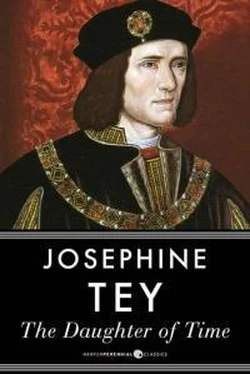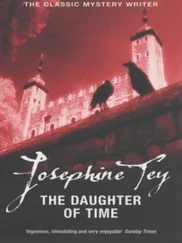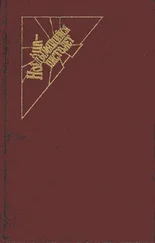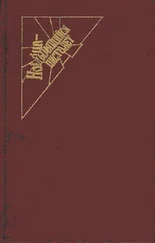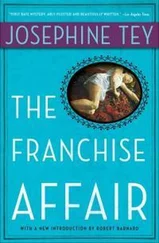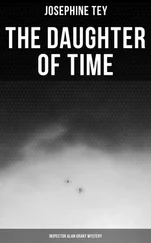He let the book slide off his chest, and searched with his hand until he found The Rose of Raby .
The Rose of Raby proved to be fiction; but it was at least easier to hold than Tanner’s Constitutional History of England. It was, moreover, the almost-respectable form of historical fiction which is merely history-with-conversation, so to speak. An imaginative biography rather than an imagined story. Evelyn Payne-Ellis, whoever she might be, had provided portraits and a family tree, and had made no attempt, it seemed, to what he and his cousin Laura used to call in their childhood ‘write forsoothly.’ There was no ‘by our ladys,’ no ‘nathelesses’ or ‘varlets.’ It was an honest affair according to its lights.
And its lights were more illuminating than Mr. Tanner.
Much more illuminating.
It was Grant’s belief that if you could not find out about a man, the next best way to arrive at an estimate of him was to find out about his mother.
So until Marta could provide him with the sainted and infallible Thomas More’s personal account of Richard, he would make do very happily with Cecily Neville, Duchess of York.
He glanced at the family tree, and thought that if the two York brothers, Edward and Richard, were, as kings, unique in their experience of ordinary life they were no less unique in their Englishness. He looked at their breeding and marvelled. Neville, FitzAlan, Percy, Holland, Mortimer, Clifford and Audley, as well as Plantagenet. Queen Elizabeth (who made it her boast) was all English; if one counted the Welsh streak as English. But among all the half-bred monarchs who had graced the throne between the Conquest and Farmer George – half-French, half-Spanish, half-Danish, half-Dutch, half-Portuguese – Edward IV and Richard III were remarkable in their home-bred quality.
They were also, he noted, as royally bred on their mother’s side as on their father’s. Cecily Neville’s grandfather was John of Gaunt, the first of the Lancasters; third son of Edward III. Her husband’s two grandfathers were two other sons of Edward III. So three of Edwards III’s five sons had contributed to the making of the two York brothers.
‘To be a Neville,’ said Miss Payne-Ellis ‘was to be of some importance since they were great landowners. To be a Neville was almost certainly to be handsome, since they were a good-looking family. To be a Neville was to have personality, since they excelled in displays of both character and temperament. To unite all three Neville gifts, in their finest quality, in one person was the good fortune of Cecily Neville, who was the sole Rose of the north long before that north was forced to choose between White Roses and Red.’
It was Miss Payne-Ellis’s contention that the marriage with Richard Plantagenet, Duke of York, was a love match. Grant received this theory with a skepticism bordering on scorn until he noticed the results of that marriage. To have a yearly addition to the family was not, in the fifteenth century, evidence of anything but fertility. And the long family produced by Cecily Neville to her charming husband augured nothing nearer love than cohabitation. But in a time when the wife’s role was to stay meekly at home and see to her stillroom, Cecily Neville’s constant travellings about in her husband’s company were surely remarkable enough to suggest an abnormal pleasure in that company. The extent and constancy of that travel was witnessed to by the birthplaces of her children. Anne, her first, was born at Fotheringhay, the family home in Northamptonshire. Henry, who died as a baby, at Hatfield. Edward at Rouen, where the Duke was on active service. Edmund and Elizabeth also at Rouen. Margaret at Fotheringhay. John, who died young, at Neath in Wales. George in Dublin (and could it be, wondered Grant, that that accounted for the almost Irish perverseness of the ineffable George?). Richard at Fotheringhay.
Cecily Neville had not sat at home in Northamptonshire waiting for her lord and master to visit her when it seemed good to him. She had accompanied him about the world of their inhabiting. There was strong presumption in favour of Miss Payne-Ellis’s theory. At the very canniest reckoning it was patently a very successful marriage.
Which perhaps accounted for the family devotion of those daily visits of Edward to his small brothers in the Pastons’ lodgings. The York family, even before its tribulations, was a united one.
This was borne out unexpectedly when, spurting the pages from under his thumb, he came on a letter. It was a letter from the two elder boys, Edward and Edmund, to their father. The boys were at Ludlow Castle, undergoing their education, and on a Saturday in Easter week, taking advantage of a courier who was going back, they burst out in loud complaint of their tutor and his ‘odiousness’ and begged their father to listen to the tale of the courier, William Smyth, who was fully charged with the details of their oppression. This SOS was introduced and ended in respectful padding, the formality of which was a little marred by their pointing out that it was nice of him to send the clothes but that he had forgotten their breviary.
The conscientious Miss Payne-Ellis had given the reference for this letter (one of the Cotton manuscripts, it appeared) and he thumbed more slowly, in search of more. Factual evidence was a policeman’s meat.
He could not find any, but he came on a family tableau which held him for a moment.
The duchess moved out into the thin sharp sunlight of a London December morning, and stood on the steps to watch them go: her husband, her brother, and her son. Dirk and his nephews brought the horses into the courtyard, scattering the pigeons and the fussing sparrows from the cobbles. She watched her husband mount, equable and deliberate as always, and thought that for all the emotion he showed he might be riding down to Fotheringhay to look at some new rams instead of setting out on a campaign. Salisbury, her brother, was being Neville and temperamental; a little conscious of the occasion and living up to it. She looked at them both and smiled in her mind at them. But it was Edmund who caught at her heart. Edmund at seventeen, very slender, very untried, very vulnerable. Flushed with pride and excitement at this setting-out to his first campaigning. She wanted to say to her husband: ‘Take care of Edmund,’ but she could not do that. Her husband would not understand; and Edmund, if he were to suspect, would be furious. If Edward, only a year older, was commanding an army of his own on the borders of Wales at this very minute, then he, Edmund, was more than old enough to see war at first-hand.
She glanced behind her at the three younger children who had come out in her wake; Margaret and George, the two solid fair ones, and behind them, a pace in the rear as always, her changeling baby, Richard; his dark brows and brown hair making him look like a visitor. Good-natured untidy Margaret watched with all the moist-eyed emotion of fourteen; George in a passionate envy and wild rebellion that he was only eleven and of no consequence to this martial moment. Thin little Richard showed no excitement at all, but his mother thought that he vibrated like a softly tapped drum.
The three horses moved out of the courtyard in a clatter of slipping hooves and jingling accoutrements, to join the servants waiting for them in the roadway, and the children called and danced and waved them out of the gate.
And Cecily, who in her time had seen so many men, and so many of her family, go off to went back to the house with an unaccustomed weight at her bosom. Which of them, said the voice in her unwilling mind, which of them was it who was not coming back?
Her imagination did not compass anything so horrible as the fact that none of them was coming back again. That she would never see any one of them again.
That before the year was ended her husband’s severed head, crowned for insult with a paper crown, would be nailed above the Micklegate Bar in York, and the heads of her brother and her son on the two other gates.
Читать дальше
